I doubt there has ever been a more dramatic college basketball debut than what transpired in Los Angeles on December 3, 1966. Lew Alcindor, UCLA’s 7′2″ sophomore center, scored 56 points in a 105-90 defeat of cross-town rival Southern Cal. His coach, John Wooden, described him with an adjective common to today’s teenagers—“awesome.” Alcindor’s three varsity seasons comprise the most 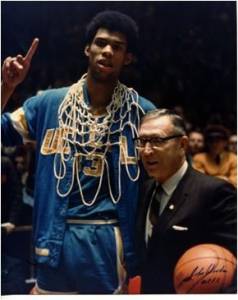 magnificent college hoops career of all time. With an unstoppable assortment of low-post tricks, he led the Bruins to three national crowns, was two-time (1967 and 1969) player of the year, and averaged 26 points and 15 rebounds per game. He shot 63% from the field. Wilt Chamberlain of Kansas, with whom he was often compared, never won a national title and left for the pros one year early.
magnificent college hoops career of all time. With an unstoppable assortment of low-post tricks, he led the Bruins to three national crowns, was two-time (1967 and 1969) player of the year, and averaged 26 points and 15 rebounds per game. He shot 63% from the field. Wilt Chamberlain of Kansas, with whom he was often compared, never won a national title and left for the pros one year early.
Of hoops and religion
Alcindor won a lot at UCLA (88 victories and 2 close losses), but he was not especially happy there. The New York native was aloof if not sullen with reporters and fellow students. He later complained about being around “all those cracker kids at UCLA” and pondered a transfer to Michigan after his sophomore season. He stayed, at least partly because Wooden directed Sam Gilbert, UCLA’s number one booster and dispenser of illicit gifts, to take good care of him. He chose not to be a member of the USA basketball team in the 1968 Mexico City Olympics—his protest against perceived racism at home. He apostatized from the Christianity in which he had been brought up, becoming a Muslim; not until his second season in the NBA did he reveal his new name of Kareem Abdul-Jabbar.
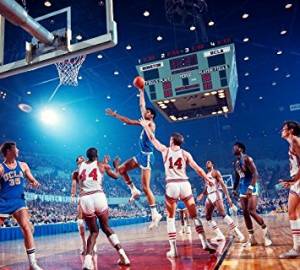 He entered pro basketball under unusual circumstances. There were two leagues then—the well-established NBA and the three-year-old ABA. The No. 1 pick of the Milwaukee Bucks of the former and of the New York Nets of the latter, he was in a very strong bargaining position. ABA owners knew that with Alcindor their survival was all but guaranteed, so they pitched in to create a fund. Commissioner George Mikan took a certified $1 million check to meet with Alcindor and his advisors at a New York hotel, but he inexplicably failed to present it! Alcindor in fact wanted to join the Nets—he spent six years in Milwaukee but never liked it—and would have signed. As a die-hard ABA guy, I can tell you I lament Mikan’s gaffe with heart and soul.
He entered pro basketball under unusual circumstances. There were two leagues then—the well-established NBA and the three-year-old ABA. The No. 1 pick of the Milwaukee Bucks of the former and of the New York Nets of the latter, he was in a very strong bargaining position. ABA owners knew that with Alcindor their survival was all but guaranteed, so they pitched in to create a fund. Commissioner George Mikan took a certified $1 million check to meet with Alcindor and his advisors at a New York hotel, but he inexplicably failed to present it! Alcindor in fact wanted to join the Nets—he spent six years in Milwaukee but never liked it—and would have signed. As a die-hard ABA guy, I can tell you I lament Mikan’s gaffe with heart and soul.
Off to a good start
At any rate, he went with the Bucks. There were a few doubters at the beginning, mostly about his rather slight frame. Abdul-Jabbar, as I will now call him, weighed just 225 pounds coming out of college. Could he handle the banging, pushing and shoving down inside? He did just fine. The 1970 NBA rookie of the year, he was primarily responsible for the team’s record changing from 27-55 to 56-26. The next year, Oscar 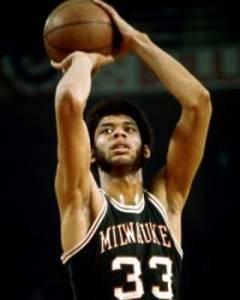 Robertson was obtained in a trade and Milwaukee won the NBA title. Abdul-Jabbar was a six-time champ in his 20-year pro career. As to his durability, he missed just 80 of 1,640 regular season games and played more than 56,000 minutes. I hate to get bogged down with numbers, but his are so very impressive. Abdul-Jabbar averaged 30 points, 16 rebounds and 5 assists in his first seven years as a pro, peaking at 35-17-5 in 1972. He demanded and got a trade to the Los Angeles Lakers in the summer of 1975. With LA, he won another five championships (1980, 1982, 1985, 1987 and 1988). Abdul-Jabbar was chosen MVP six times and ended up with 38,387 points—still the most in league history. He snagged 17,440 rebounds and blocked 3,189 shots; the guy could play defense too.
Robertson was obtained in a trade and Milwaukee won the NBA title. Abdul-Jabbar was a six-time champ in his 20-year pro career. As to his durability, he missed just 80 of 1,640 regular season games and played more than 56,000 minutes. I hate to get bogged down with numbers, but his are so very impressive. Abdul-Jabbar averaged 30 points, 16 rebounds and 5 assists in his first seven years as a pro, peaking at 35-17-5 in 1972. He demanded and got a trade to the Los Angeles Lakers in the summer of 1975. With LA, he won another five championships (1980, 1982, 1985, 1987 and 1988). Abdul-Jabbar was chosen MVP six times and ended up with 38,387 points—still the most in league history. He snagged 17,440 rebounds and blocked 3,189 shots; the guy could play defense too.
I would be remiss if I failed to mention Abdul-Jabbar’s go-to shot—the sky hook. This was part of his game in college, but not until he got to Milwaukee did he perfect it. The combination of balance, altitude and timing made it a devastating weapon and one he used often. Blocking it was virtually impossible. I am puzzled by the disappearance of the sky hook or some variant thereof. Contemporary players, when asked about it, say it is not cool or sexy, but I disagree.
Love him or loathe him
Truthfully, Abdul-Jabbar was a different player at the end. He was heavier, less flexible, of no use in the Lakers’ high-octane running game (orchestrated, starting in 1980, by Earvin “Magic” Johnson) and saved himself for key moments. An average of 10 points and four boards per game in 1989 is sufficient proof that he needed to get in his rocking chair. He had his admirers, but some fans despised him. On December 9, 1977, Abdul-Jabbar held the arms of the Houston Rockets’ Kevin Kunnert while his teammate, Kermit Washington, whaled away. When Kunnert’s teammate, Rudy  Tomjanovich, came on the scene, Washington really unloaded. This was not long after Abdul-Jabbar sucker-punched the Detroit Pistons’ Kent Benson. He did the very same thing to Tom Burleson of the Seattle SuperSonics. Thus, many people—especially European-Americans since Kunnert, Tomjanovich, Benson and Burleson were all European-American—were delighted when Dennis Awtrey (European-American) of the Phoenix Suns busted the Lakers’ center.
Tomjanovich, came on the scene, Washington really unloaded. This was not long after Abdul-Jabbar sucker-punched the Detroit Pistons’ Kent Benson. He did the very same thing to Tom Burleson of the Seattle SuperSonics. Thus, many people—especially European-Americans since Kunnert, Tomjanovich, Benson and Burleson were all European-American—were delighted when Dennis Awtrey (European-American) of the Phoenix Suns busted the Lakers’ center.
Abdul-Jabbar is quite a prolific “author,” having “written” Giant Steps (1983; in which he confessed how much pleasure he got whenever he read of a disaster such as an airplane crash, in which all of the victims were European-American); Black Profiles in Courage (1996); A Season on the Reservation (2000); Brothers in Arms (2004); On the Shoulders of Giants (2007); What Color is My World? (2012); Writings on the Wall (2016); Becoming Kareem (2017) and Coach Wooden and Me (2017). Only the last was done without the aid of a European-American ghostwriter. This underwhelms 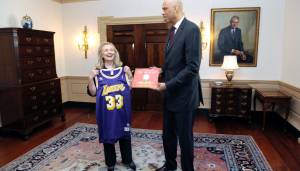 me. If Abdul-Jabbar has to have a pro help him formulate his ideas and fix his grammar, content and so forth, he cannot be much of a writer. I do my own research, I write and edit my own stuff, and readers can draw judgments on that alone. I need no ghostwriter, European-American or otherwise.
me. If Abdul-Jabbar has to have a pro help him formulate his ideas and fix his grammar, content and so forth, he cannot be much of a writer. I do my own research, I write and edit my own stuff, and readers can draw judgments on that alone. I need no ghostwriter, European-American or otherwise.
As indicated earlier, Abdul-Jabbar alienated or just plain pissed off a lot of people. At the conclusion of his playing career, he seemed to think he would be given an assistant coaching job, followed shortly by promotion to head coach. Nothing of the sort happened. He had stints as a “technical assistant” with the Lakers, Clippers and Sonics, but that’s it. He did a bit of scouting for the Knicks—a long way from being an NBA head coach. He served one year as head coach of the Oklahoma Storm of the United States Basketball League; I admit that I had never heard of that team or that league until writing the present piece. Abdul-Jabbar also coached at a high school on an Indian reservation in Arizona. It too lasted just one year.
Warm and cuddly?
Abdul-Jabbar, to his credit, has tried to soften his brooding and dour public image. Playing the character Roger Murdock in Airplane (1980) helped, and he has been in numerous other movies and television shows, often playing himself. He has given interviews in which he took some measure of responsibility for the negative vibe he engenders among many—though surely not all—Americans. These days he is often seen in carefully posed pictures, with a nice smile, striving not to seem threatening or 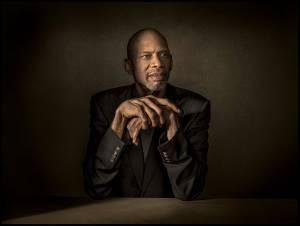 enigmatic. He has frankly stated his regrets, often saying, “I wish I would have….” (Among other things, Abdul-Jabbar has money problems. He picked a financial advisor who, sad to say, knew little about finance.) He makes funny comments on Twitter, goes on talk shows and appears at seminars. In doing so, he manages to come off as both amiable and the serious man he has been since his days as a hoopster with the UCLA Bruins.
enigmatic. He has frankly stated his regrets, often saying, “I wish I would have….” (Among other things, Abdul-Jabbar has money problems. He picked a financial advisor who, sad to say, knew little about finance.) He makes funny comments on Twitter, goes on talk shows and appears at seminars. In doing so, he manages to come off as both amiable and the serious man he has been since his days as a hoopster with the UCLA Bruins.
During the Obama administration, Abdul-Jabbar was named as a cultural ambassador although I do not know exactly what his duties were or how much he was paid. As the Gershwins wrote, nice work if you can get it. Since January 2017, he has been a member of the President’s Council on Fitness, Sports and Nutrition.
There with Wilt, Russ, Mike and King James
I would not be going out on a limb by saying Abdul-Jabbar is among the five best players of all time (Chamberlain, Bill Russell, Michael Jordan and LeBron James being the others). He was diagnosed with leukemia in 2008 and cardiovascular disease a few years later, having to undergo quadruple-bypass surgery. Few sportsmen have stood in the spotlight longer than KAJ, who strikes me these days as being obsessed with his legacy.

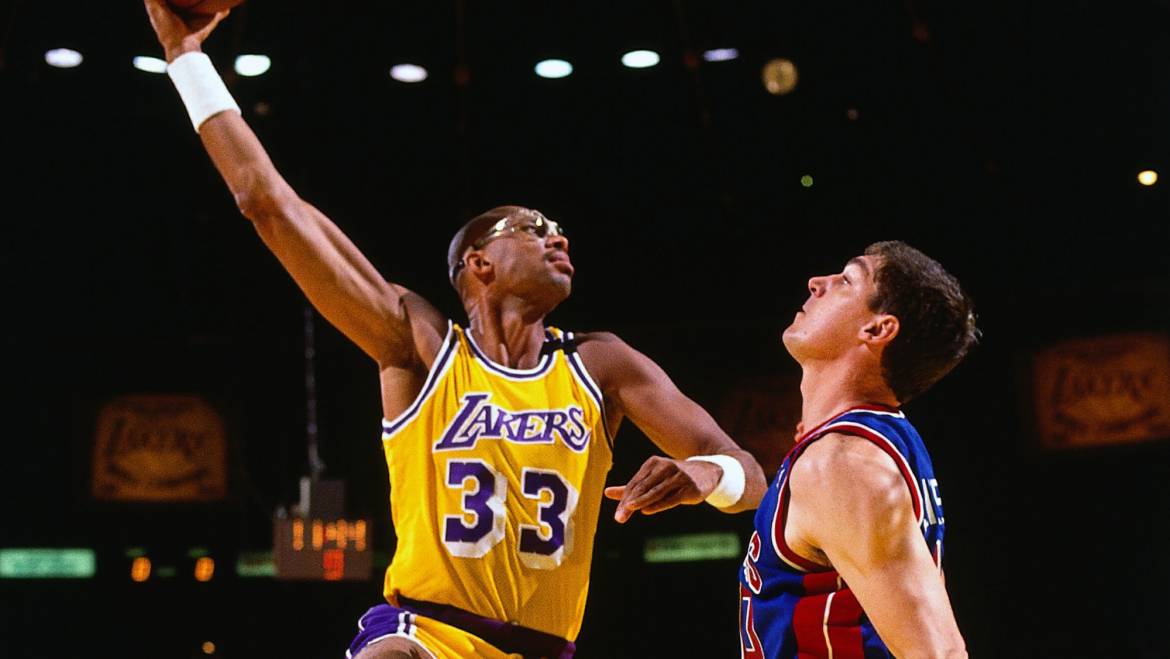
6 Comments
Larry Bird? Jerry West? Dang! He is a Colin Kaepernick from the 80’s. I don’t like him, or at least don’t like what he was. I don’t know what he is like now, but I doubt it has changed.
Kenny, I wish the five best basketball players ever were West, Bird, Barry, Walton and some other guy of European descent (Bob Pettit? Dirk Nowitzki?). Alas, that is not the case. I have since edited this story, including reference to Sam Gilbert–UCLA’s big sugar-daddy.
Good article, Richard. A very good b-ball player, but a very flawed man. He enjoyed plane crashes if they killed only white people? There’s word for someone who thinks like that.
Yes, and he admitted it in his autobiography. The media sure is nice to him…. Thanks for your comment from Maryland, Lt. Nietmann!
Seems like the one who’s taking this more personal is you. Kareem hitting Benson was due to Benson sucker elbowing him, knocking the wind out of him. He’d deserved it. Regarding Tom Burleson. He kept on holding on to Kareem, because he couldn’t contain him defensively. Should he let his anger get the best of him? Probably not. But I can understand why. Especially if Tom is not getting called for fouls, doing this. Regarding how Kareem felt about white people. I also understand his position on that too. He came from the Jim Crow era, where white racism was in your face. So when a man gets to see that and a lot of other worse sh@t from whites. There is going to be anger.
Kareem has every right to be concerned with his legacy. He’d owned t and the Laker franchise pretty much screwed him over, not putting a statue up of the highest scorer and several other records that he had. That was done on purpose, overlooking him. KAJ shouldn’t had to even demand a statue. His religion. To me it’s subjective. I don’t believe in religion. but i also understood his choice for that, during a VERY racist climate.
In his book, he admits to some regrets. But he also stands his ground of some issues. From what I’ve read so far. It’s are reasonable. Love him or hate him Kareem’s game was tight and no one could stop him during his prime and later years.
I have reviewed my article and can find nothing that merits retraction or change of any kind. I had lots of good things to say about Jabbar as a college and pro basketball player. How much Jim Crow did he face growing up in NYC? As to whether the Lakers put a statue up of him, that’s of no interest to me. You refer to some book he wrote but do not say which. The odds are 6 out of 7 that it was ghost-written by a European-American. I stand my ground too.
Add Comment